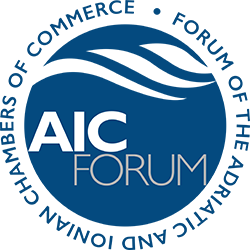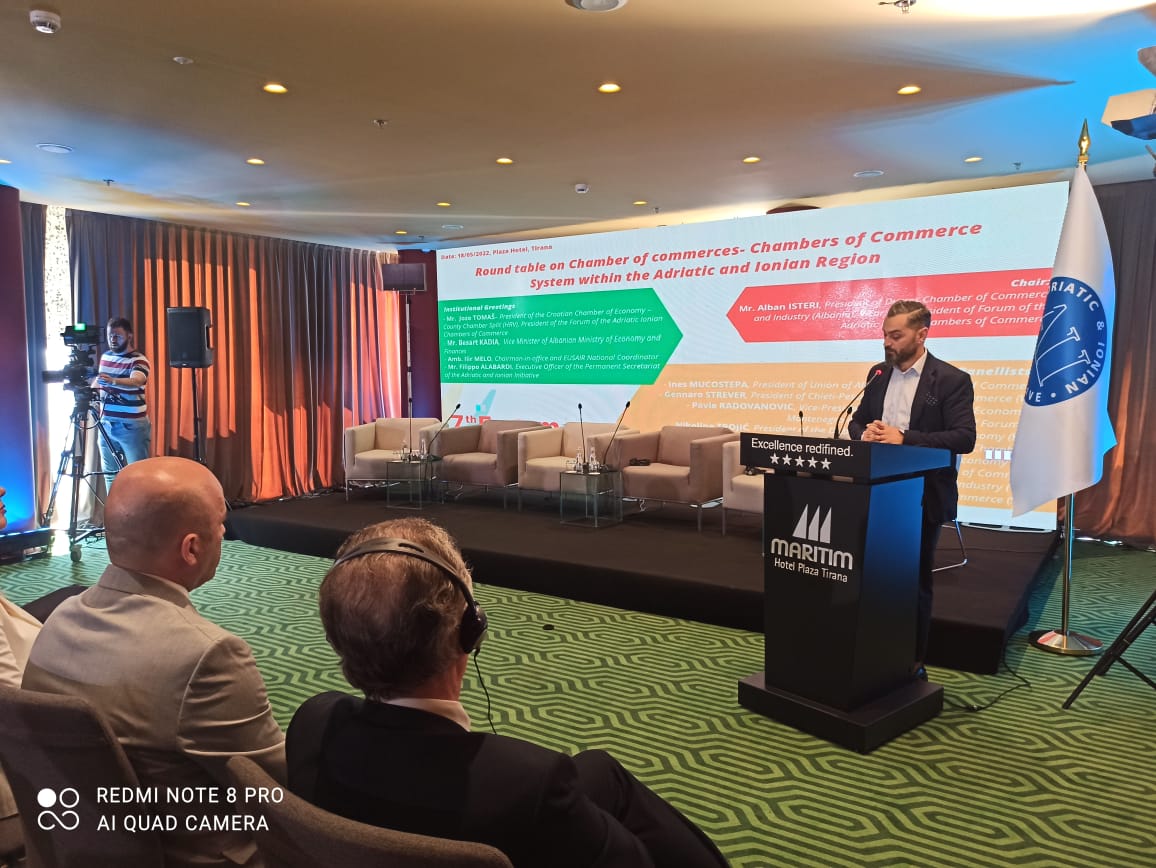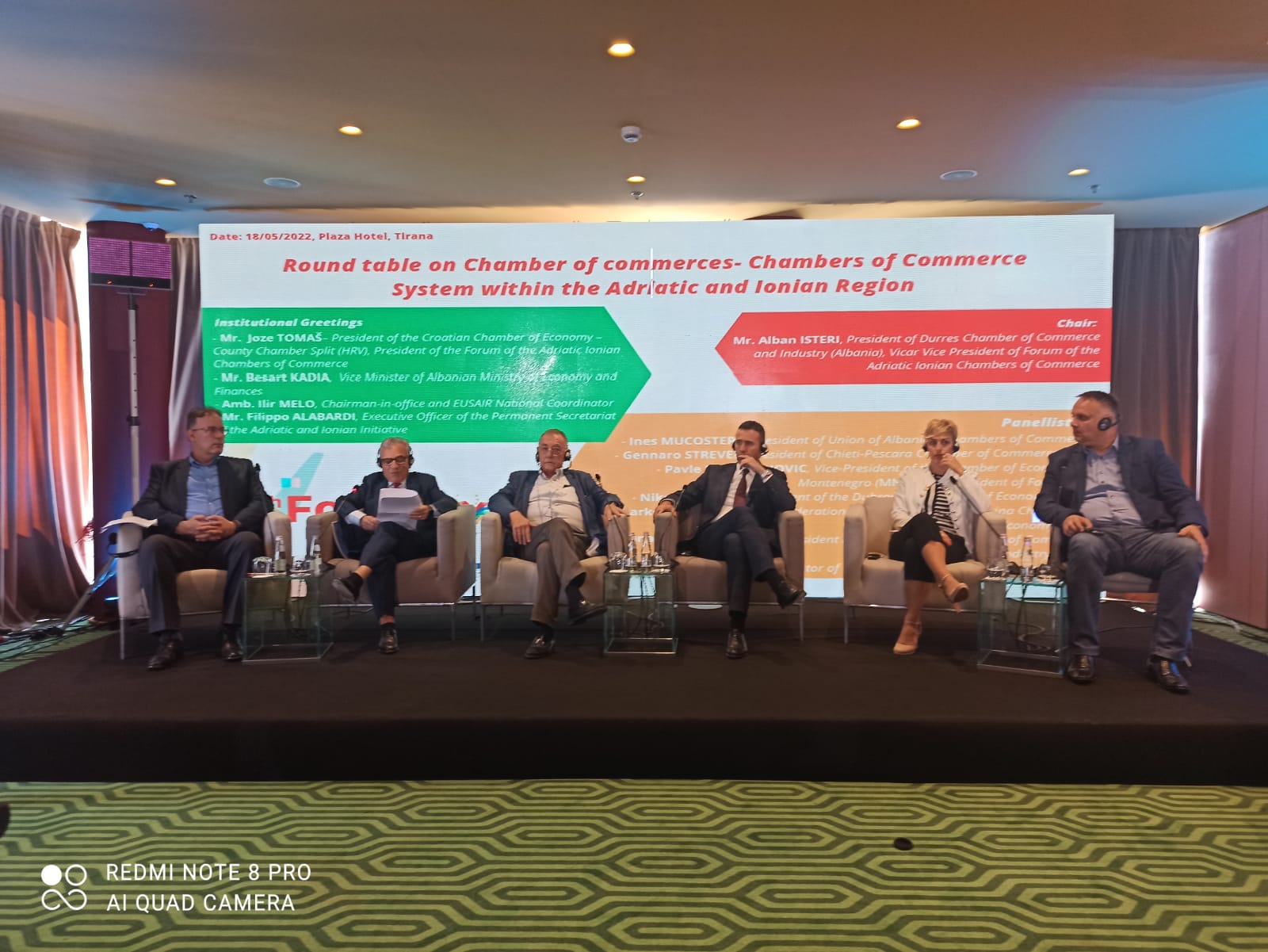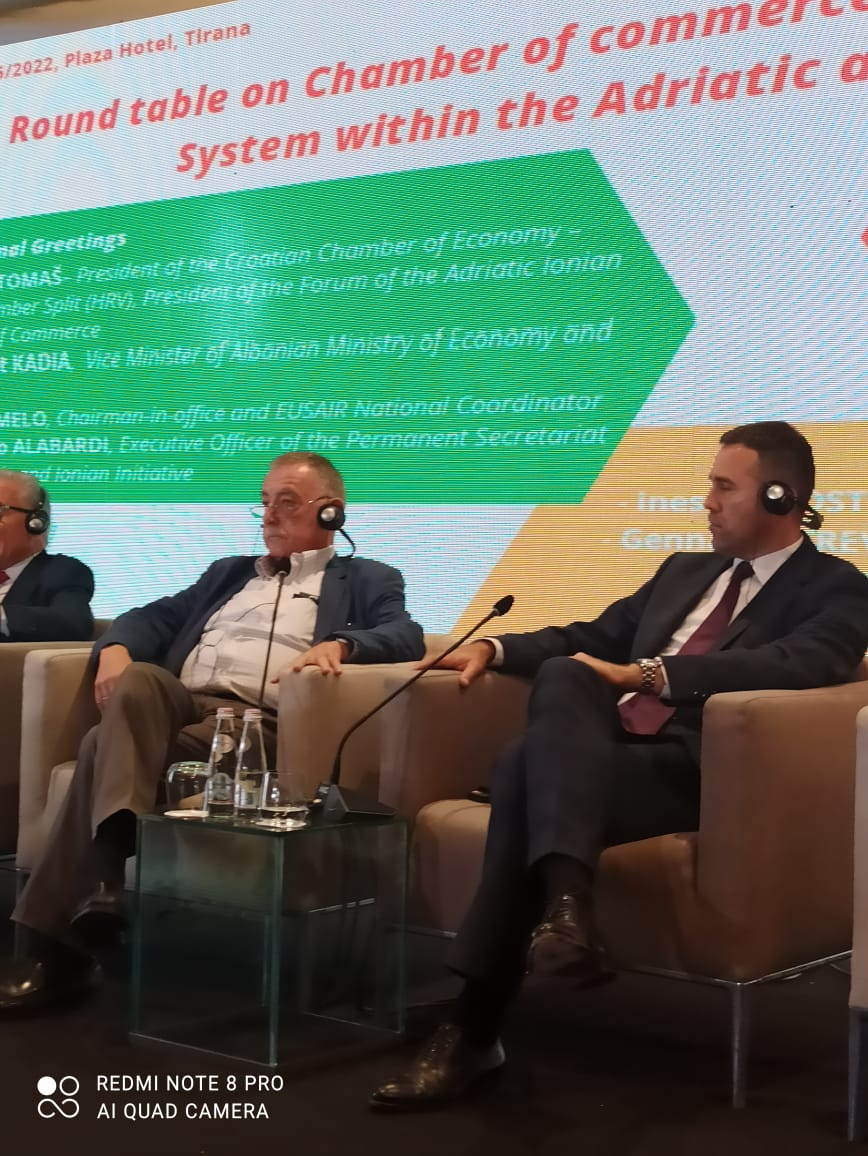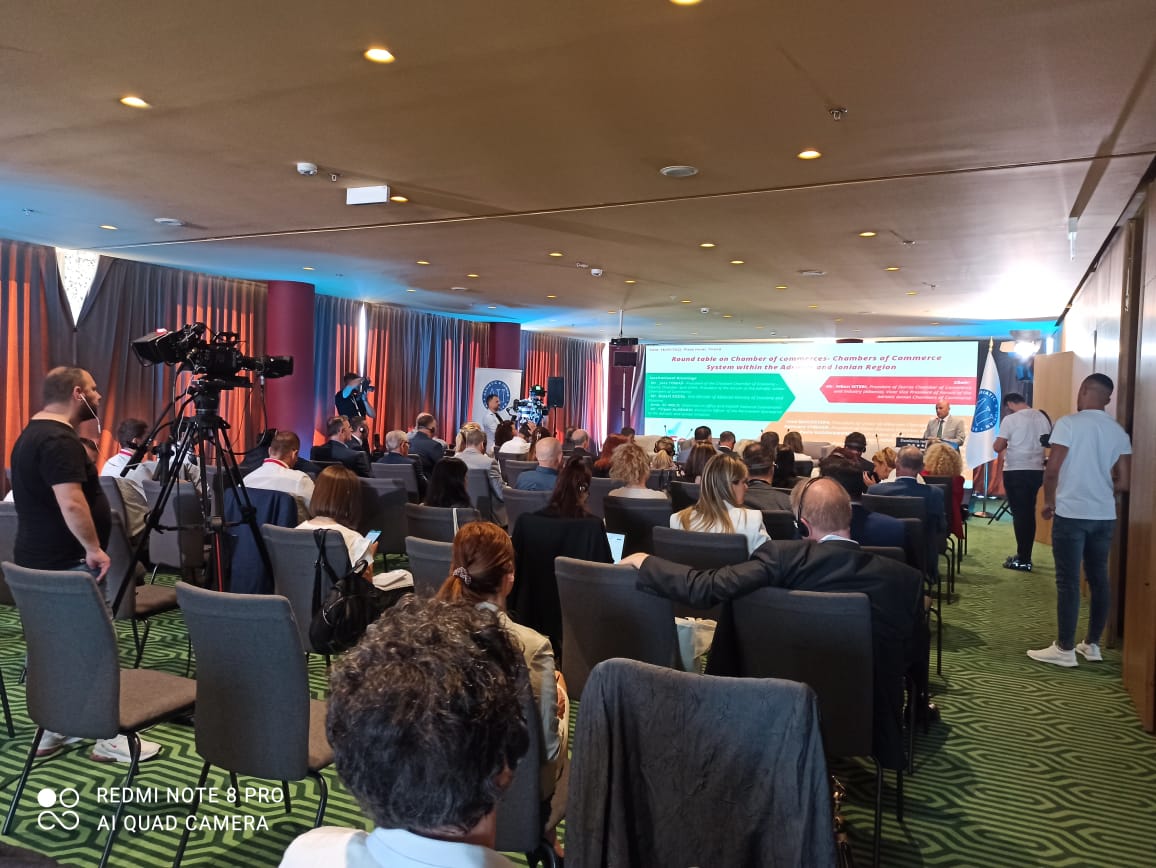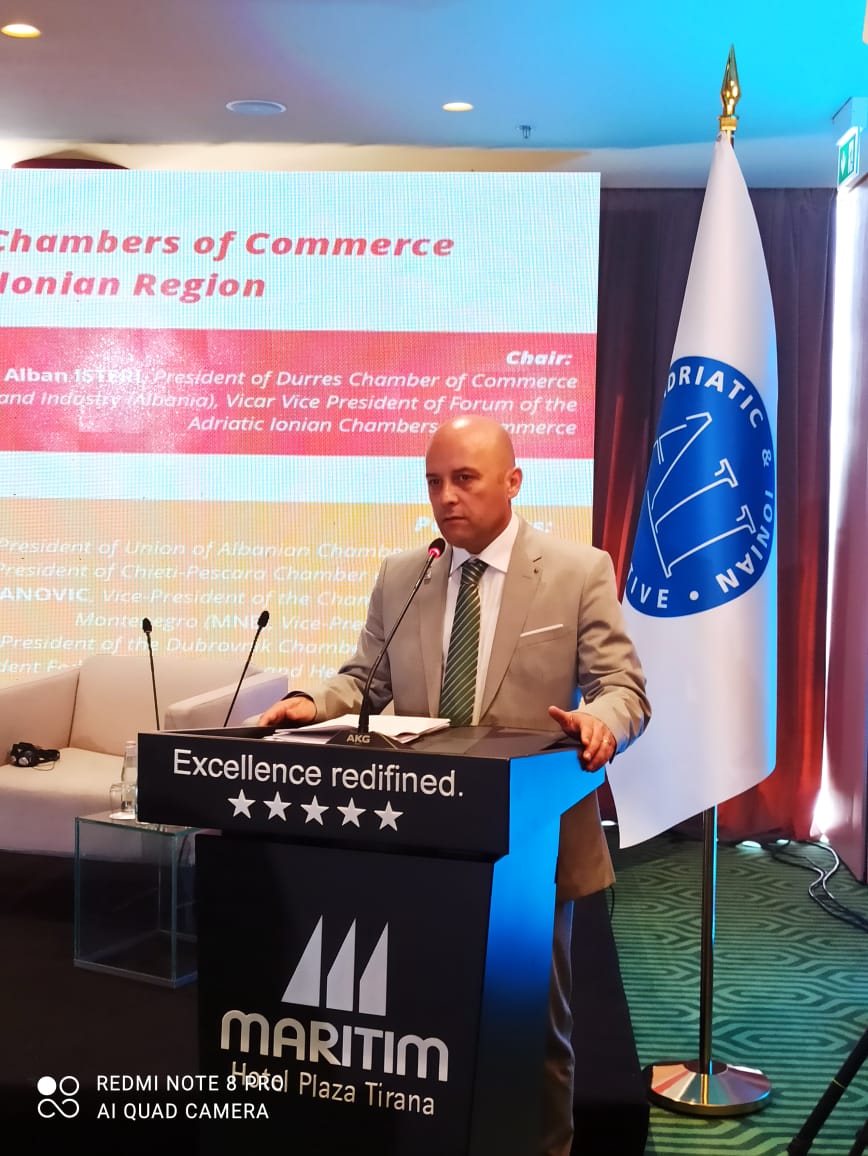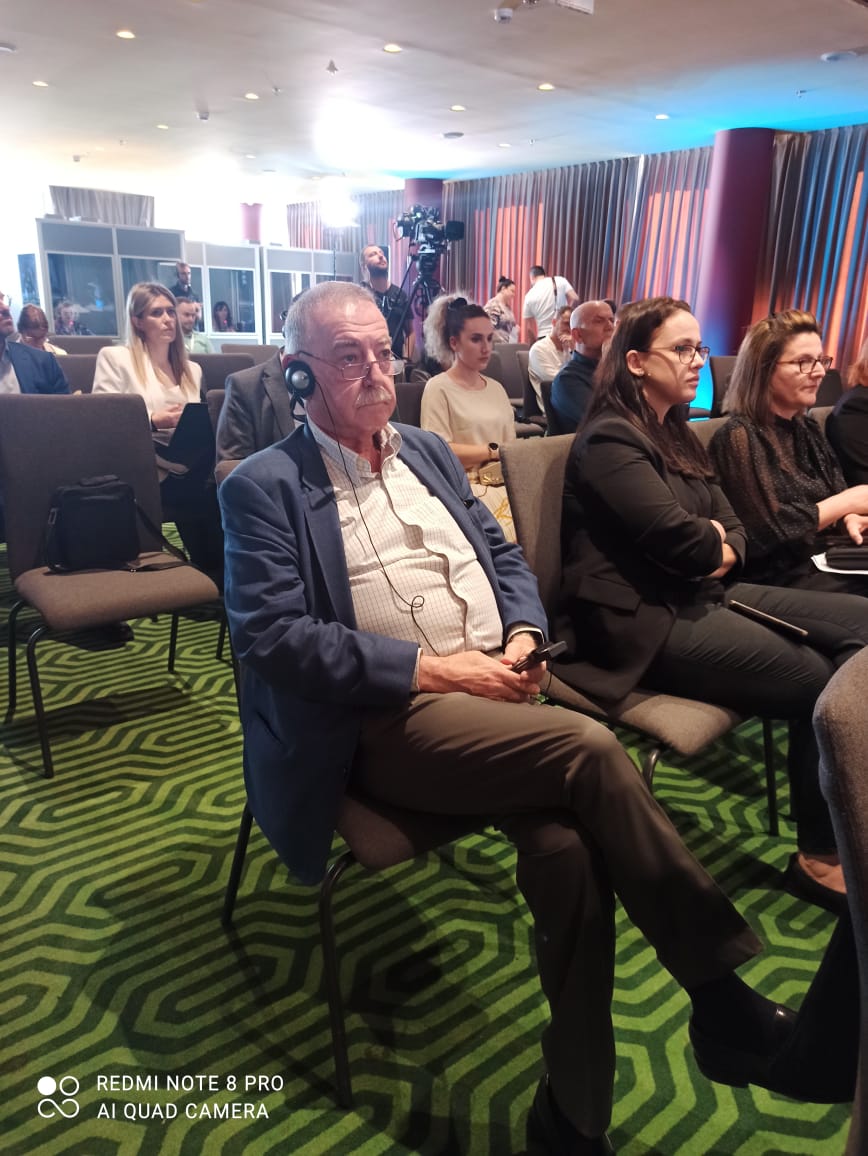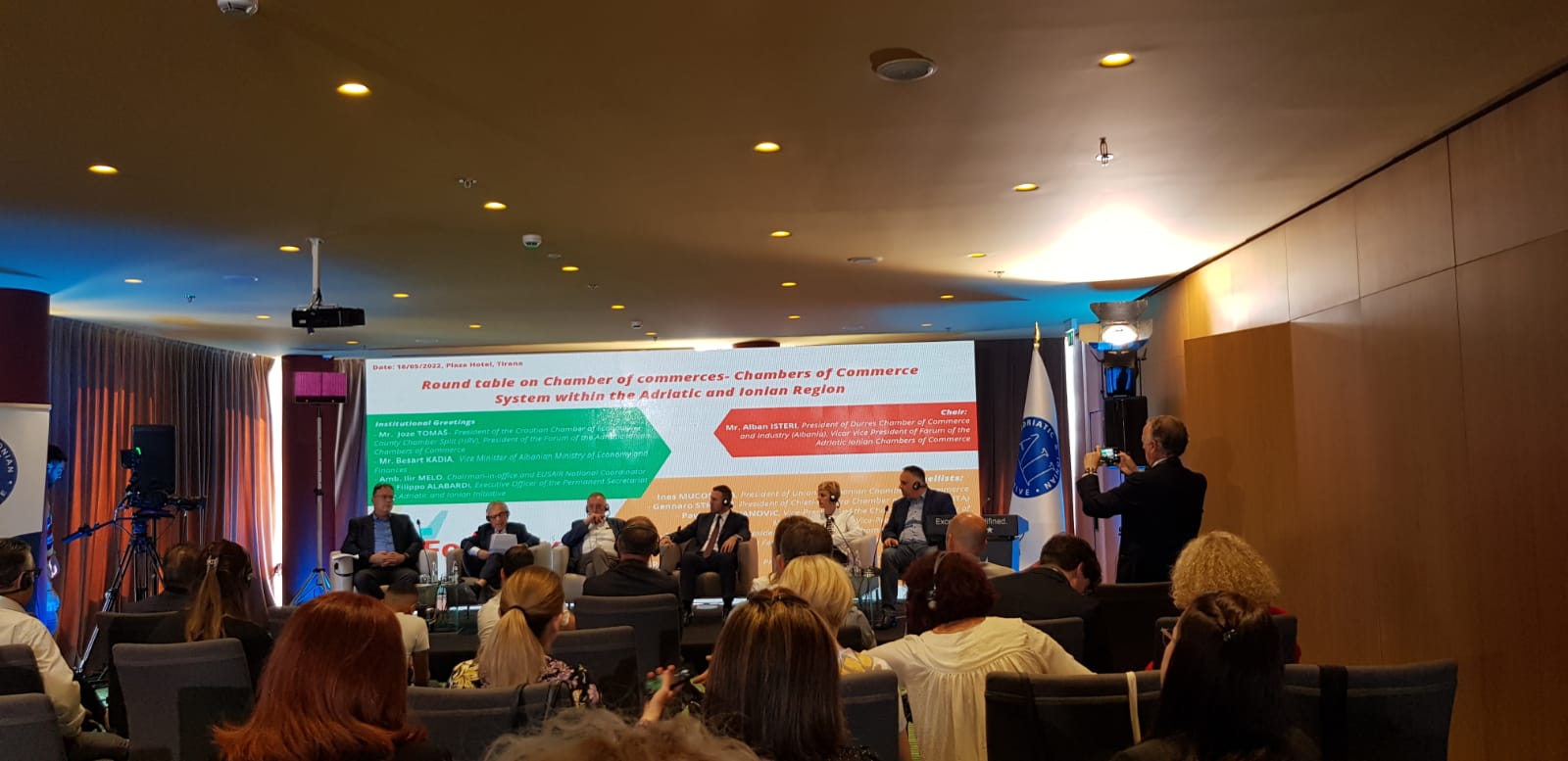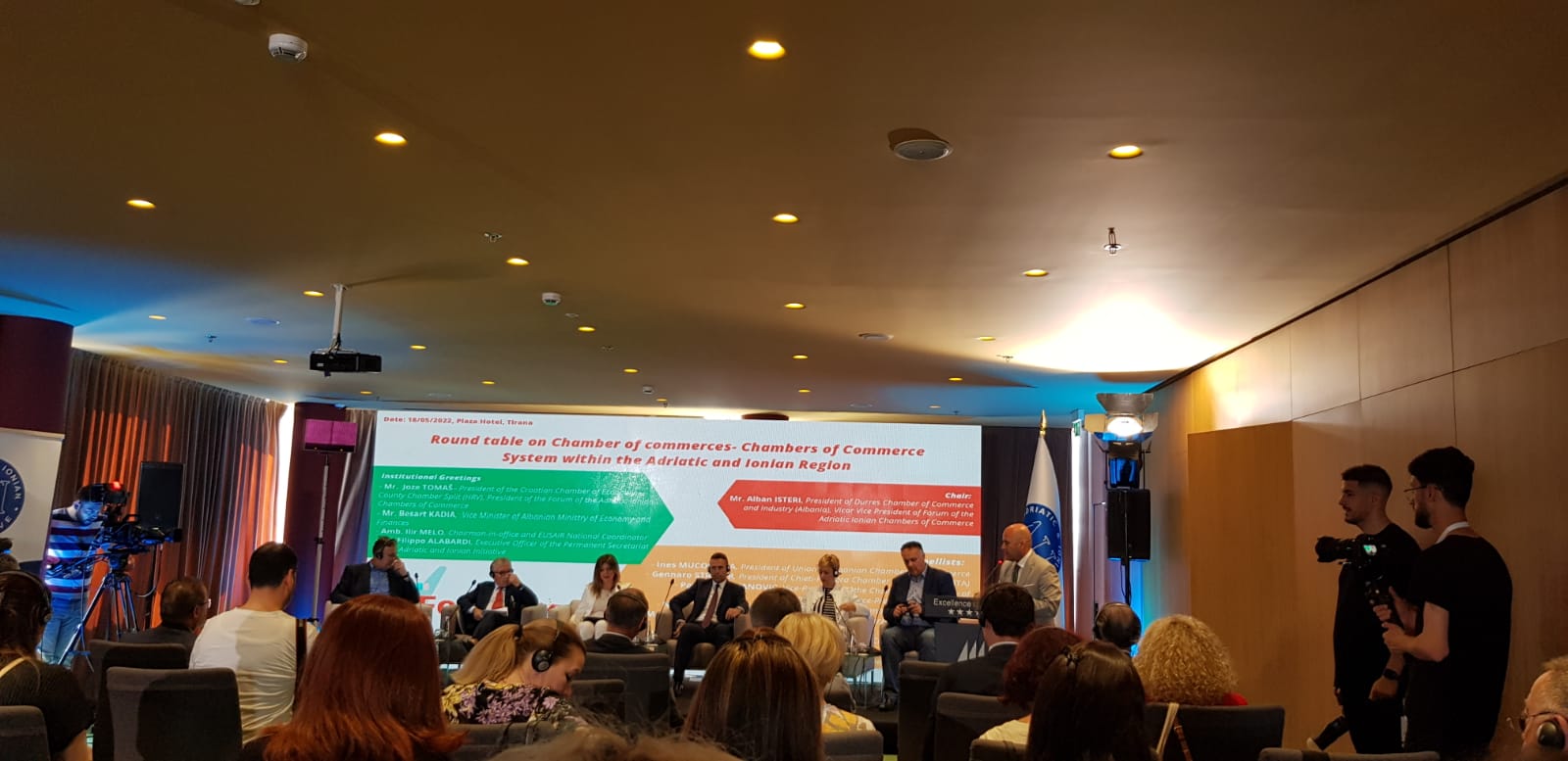The IAI Round Table on the Chamber System in the Adriatic and Ionian Region was held on 18 May 2022, organized by the Durazzo Chamber in collaboration with the AIC Forum and the Ionian Adriatic Initiative
Chambers of Commerce, especially in recent years of crisis, have played a leading role in supporting local businesses by guaranteeing useful and quality services to businesses.
Through understanding their functioning and cooperation through transnational associations such as the Forum of the Adriatic and Ionian Chambers of Commerce (Forum AIC), it is possible to strengthen cooperation with governments to create greater synergy on the macro-regional territory.
The aim of this conference was to deepen the role of the different chamber systems in the Adriatic-Ionian area and to understand the role that the Chambers of Commerce can play in the further development of EUSAIR.
Opening session
The institutional and introductory greetings moderated by Alban Isteri, President of the Chamber of Commerce of Durazzo, saw the intervention of the President of the AIC Forum Joze Tomas, Albanian Deputy Minister of Finance and Economy Besart Kadia, Albanian National Coordinator EUSAIR Amb. Ilir Melo and the Executive Officer of the Permanent Secretariat AII Filippo Alabardi.
President Tomas opened the greetings by stressing the important role that the Chambers of Commerce have had on the recognition and implementation of the EUSAIR Strategy from the beginning, and how more generally the activities carried out by the Association in recent years have “encouraged sustainable development, cohesion and solidarity of communities in the area through an efficient and bottom-up participatory approach“.
Besart Kadia underlined Albania’s strong interest in continuing the process of European integration, also in the light of the latest global crises of the pandemic and the recent war in Ukraine. From the Albanian Ministry of Finance and Economy there is the maximum support regarding the strengthening of relations with the Chambers of Commerce of the Ionian Adriatic Region, recognizing the fundamental role that they constitute for the development of entrepreneurship and territories.
The Amb . Ilir Melo, at the end of his term as Albanian EUSAIR Presidency, reviewed the activities carried out over the last year and reiterated the importance of the EUSAIR Strategy and how much more can be improved through interventions on local policies and projects in favour of citizens’ needs.
Filippo Alabardi underlined the support of the Ionian Adriatic Initiative in supporting civil society that gives added value and concrete actions to the EUSAIR Strategy. He recalled the instrument and the value of the round tables as a “main instrument” to give voice to the needs of the main stakeholders and put them in connection with EUSAIR governance for the implementation of the strategy itself, then recognising the decisive role of the FORA dedicated to this purpose.
Round Table on the Chamber System in the Adriatic and Ionian Region
We then moved on to the heart of the event. The speakers covered almost all the area of the Macro-region, making available their experiences and skills to discuss how the Chambers of Commerce can best respond to the evolution of the Adriatic-Ionian Area.
President Isteri suggested, in this regard, as a follow-up to the event, a joint statement to be presented to the various governments that is a reference to reforms necessary to improve the performance of the Chambers of Commerce and make them available to companies and territories.
The speakers, representing the chamber systems of the different countries of the Ionian Adriatic Region, focused on the following aspects:
- the function of the chamber system in your country;
- the description of some peculiar best practices in support of local business and for the benefit of local communities;
- the role that the Chambers of Commerce can play in the development of the EUSAIR strategy in view of the forthcoming revision of the Action Plan.
The first speech saw the presentation of Ines Mucostepa, President of the Union of Albanian Chambers of Commerce. The first focus was given to the law currently in force in Albania regarding the non-mandatory registration of companies within regional Chambers of Commerce.
Despite the obvious economic difficulties of the Chambers in fulfilling their obligations, Ms Mucostepa nevertheless stressed the commitment of the entire chamber system to provide increasingly better and relevant services for all Albanian companies (inside and outside the state), also in light of the recent global crises. In support of this purpose, she recalled the commitment within various international networks (EUSAIR, IAI, WB6, Open Balkan etc.) “with the mission of eliminating any type of barrier that brings problems in trade between our countries“.
Specifically, the main services provided by the Chambers of Commerce in Albania, whose main objectives can be reduced in support, advice and training aimed at improving the entrepreneurial climate, have been transferred. President Mucostepa concluded by calling for greater listening by government forces to the Chambers, that although “not all have the same legislation or the same strength, all must have the same value and all must have the same intensity of work in improving our economies“.
The second intervention saw the participation of Gennaro Strever, President of the I.A.A Chamber of Commerce of Chieti-Pescara. The President presented the main themes of the Italian Chamber of Commerce development plan, aimed at supporting the economic and productive fabric of the State, in addition to the “valuable role of observatory on the development trends of our SMEs“.
The data and the economic survey constitute in fact the backbone of the Italian chamber of commerce, providing information about the skills and shortcomings of Italian entrepreneurship: in this sense, President Strever reiterated the value of the training provided by the Chambers of Commerce, aimed at a widespread “literacy” of companies in all sectors, from the green transition to the digital one.
According to President Strever “Strengthening the economic integration of the Ionian Adriatic area is important to offer our companies development opportunities through commercial ties, investments and synergies in the fields of research and infrastructure with great prospects in this historical phase.“
Pavle Radovanovic, Vice-President of the Chamber of Commerce and Economy of Montenegro, explained the pivotal point of the Montenegrin Chamber of Commerce system, namely the obligation to register with the business register. This obligation has led to an increase in the quality of enterprises in Montenegro but a decrease in the number of enterprises. In this sense, the State has therefore decided to allocate funds to support, remaining in close contact with the State Chamber of Commerce which therefore acts as a channel between companies and the government. In fact, Dr. Radovanovic stressed the importance of the role of his institution in supporting companies, also in view of the difficult conditions observed in recent years: “in the period of the pandemic and now of the war, we must not adapt this situation to companies but rather support them“. In Montenegro, there is close contact between the State, the Chamber of Commerce and trade union representatives, which triggers a synergy aimed at supporting the entire Montenegrin economy while keeping pace with the needs of businesses.
Nikolina Trojic, President of the Dubrovnik County Chamber of Commerce. After giving an overview of the presence on the territory of the various Croatian Chambers of Commerce, she explained how the system has changed according to the Covid-19 pandemic.
The registration of companies with the Chamber of Commerce, while remaining mandatory, has however seen the abolition of membership fees for small businesses, leading to a drastic cut in chamber resources. This has also led to a change in the Chamber’s directives, which are now focused more on profit than on projects for social development. However, the Chamber of Commerce system, prior to the pandemic, had already provided for the digitisation of its services, facilitating the training and information of entrepreneurs. Finally, the President concluded her speech by analysing the European socio-economic situation, considering the progress of the Asian market and the increasingly evident dependence on their raw materials: “we can and must prevent this if we want the European economy to be competitive“.
The President of the Chamber of Commerce of the Federation of Bosnia and Herzegovina, Marko Santic, then took the floor and explained the main problem of his Chamber of Commerce, namely the ageing of the Chamber of Commerce, in a state of immobility since its creation in 1989. Another problem is related to the different actors in the system, with regional or sectoral representation, with which it is difficult to coordinate at the state level. In this sense, the President has in fact declared to look for ideas within the Member Chambers of the AIC Forum to identify best practices to be followed.
In conclusion, Mr Santic then relied on the need for the benefits of European integration, also on the basis of the crises of recent years, through close collaboration inside and outside the country.
Panagiotis Tsichritzis, President of the Chamber of Commerce of Aetoloakarnania, after having identified in detail the main structures of Greek chamber operation, highlighted the main distinctive features of the Greek chamber system.
First, the Business Register (GEMI) that determines the chamber’s main inflow. The chambers in fact are not subsidized by the State, being totally independent. Next, support to companies through the development and participation in European support programmes for entrepreneurship, as well as one-stop shops available for the needs of different bodies. In conclusion, the President attested to the inability of the Chambers to intervene within the governmental line of conduct, not being taken into account with regard to the stipulation of new state policies.
Robert Rakar, Director of the Primorska Chamber of Commerce and Industry explained the complicated structure of the Slovenian system, describing it as the first chamber issue. This structure has in fact meant that, together with the annulment of the compulsory registration of companies, a large decrease in the chamber of commerce administration was reached, with an evident crisis of the system.
The ever smaller registrations and a division of membership fees in a non-centralized way, has therefore introduced “cannibalism” between chambers, intent on stealing each other’s few businesses present in the territory.
With the pandemic crisis, through its updated services, it was possible for the Chamber of Commerce to again capture the interest of entrepreneurs, thus registering an interest of companies to associate again.
Finally, regarding the state-level relationship with the government, Director Rakar said that “what has been done in the last 15 years has certainly been to weaken the chamber system in Slovenia“, no longer having the tools to consult the parliament regarding the drafting of the new laws.
President Alban Isteri concluded the round table by again drawing attention to the future “Declaration of Tirana” which could highlight the potential of the Chambers of Commerce in the eyes of governments and EUSAIR governance and strengthen the system of Chambers of Commerce of the Ionian Adriatic Region as a whole, in further favour of the European integration process for non-EU states.
